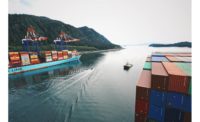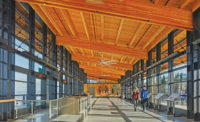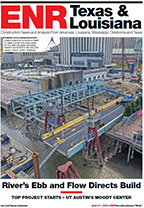
After a trade dispute escalated between the U.S. and Canada over "Buy American" procurement provisions, the Alaska Dept. of Transportation abruptly cancelled a construction bid for the Prince Rupert Ferry Terminal in British Columbia.
On Jan. 21, Canada invoked an anti-sanctions law, the Foreign Extraterritorial Measures Act (FEMA), which exposes companies that agree to Buy American provisions in contracts for construction on Canadian soil to fines up to $1.5 million, said a spokesman with Foreign Affairs, Trade and Development Canada.
The previous day, Patricia Eckert, international trade adviser for Alaska Gov. Bill Walker (I), told ENR that the governor would not ask the U.S. Federal Highway Administration for a waiver for Canadian firms from Buy American provisions. The bid would open on Jan. 21, as scheduled, she said. That changed after Canada invoked a law that blocked provisions in the bid, Eckert said. "We don't have a direct response to FEMA but don't feel there is a good atmosphere to proceed with the project," she said.
The port is on Canadian land but leased to Alaska until 2063. All the terminal's iron and steel products are subject to Buy America provisions, under the 2008 American Recovery and Reinvestment Act. The Canadian Institute of Steel Construction called for retaliation. "If you won't let us work down there, you can't work on our bridges," says Tareq Ali, spokesman for CISC.
"The federal government must not allow these Buy American provisions to apply on Canadian soil. It is just not acceptable," said B.C. Premier Christy Clark in a statement.
Michael Atkinson, Canadian Construction Association president, says requesting waivers is a better solution than retaliation. "We're not advocating a similar 'Buy Canada' program," Atkinson says. "If we were to have a blanket prohibition against U.S. materials, we wouldn't be able to build anything."
Atkinson says contractors—even those who stand to benefit—don't like programs like Buy America because they ultimately become charged with policing them. "Our association does not like preferential contracts," Atkinson says. "And contractors don't want to have to account for every beam or board they use, either."
CISC says the Buy American Act violates the North American Free Trade Agreement. For example, the St. Lawrence corridor project, which includes the new $5-billion Champlain Bridge and $500 million in upgrades for Great Lakes port facilities, is one of the largest ongoing infrastructure projects in North America.
CISC wants U.S. labor and materials barred until the Buy American provisions are repealed. "We have massive infrastructure that is aging, and there is going to be a lot of work in the coming years," Ali says. "Canada's projects are open to the world, so our big thing is reciprocity."
Atkinson says the dispute "is better resolved through bilateral trade talks than retaliation."
The ferry-terminal job is relatively small—$15 million to $20 million. It could set a dangerous precedent for the Canadian construction and materials sectors, Ali says.




